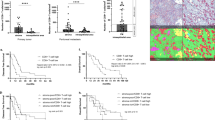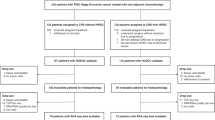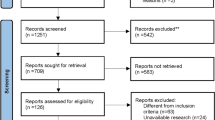Abstract
The occurrence of peritoneal carcinomatosis is a major cause of treatment failure in colorectal cancer and is considered incurable. However, new therapeutic approaches have been proposed, including cytoreductive surgery combined with hyperthermic intraperitoneal chemotherapy (HIPEC). Although HIPEC has been effective in selected patients, it is not known how HIPEC prolongs a patient’s lifespan. Here, we have demonstrated that HIPEC-treated tumor cells induce the activation of tumor-specific T cells and lead to vaccination against tumor cells in mice. We have established that this effect results from the HIPEC-mediated exposure of heat shock protein (HSP) 90 at the plasma membrane. Inhibition or blocking of HSP90, but not HSP70, prevented the HIPEC-mediated antitumoral vaccination. Our work raises the possibility that the HIPEC procedure not only kills tumor cells but also induces an efficient anticancer immune response, therefore opening new opportunities for cancer treatment.
This is a preview of subscription content, access via your institution
Access options
Subscribe to this journal
Receive 50 print issues and online access
$259.00 per year
only $5.18 per issue
Buy this article
- Purchase on SpringerLink
- Instant access to the full article PDF.
USD 39.95
Prices may be subject to local taxes which are calculated during checkout




Similar content being viewed by others
References
Elias D, Lefevre JH, Chevalier J, Brouquet A, Marchal F, Classe JM et al. Complete cytoreductive surgery plus intraperitoneal chemohyperthermia with oxaliplatin for peritoneal carcinomatosis of colorectal origin. J Clin Oncol 2009; 27: 681–685.
Spiliotis JD . Peritoneal carcinomatosis cytoreductive surgery and HIPEC: a ray of hope for cure. Hepatogastroenterology 2010; 57: 1173–1177.
Kroemer G, Galluzzi L, Kepp O, Zitvogel L . Immunogenic cell death in cancer therapy. Annu Rev Immunol 2013; 31: 51–72.
Garg AD, Nowis D, Golab J, Vandenabeele P, Krysko DV, Agostinis P . Immunogenic cell death, DAMPs and anticancer therapeutics: an emerging amalgamation. Biochim Biophys Acta 2010; 1805: 53–71.
Lanneau D, Brunet M, Frisan E, Solary E, Fontenay M, Garrido C . Heat shock proteins: essential proteins for apoptosis regulation. J Cell Mol Med 2008; 12: 743–761.
Murshid A, Gong J, Calderwood SK . The role of heat shock proteins in antigen cross presentation. Front Immunol 2012; 3: 63.
Spisek R, Charalambous A, Mazumder A, Vesole DH, Jagannath S, Dhodapkar MV . Bortezomib enhances dendritic cell (DC)-mediated induction of immunity to human myeloma via exposure of cell surface heat shock protein 90 on dying tumor cells: therapeutic implications. Blood 2007; 109: 4839–4845.
Pockley AG . Heat shock proteins as regulators of the immune response. Lancet 2003; 362: 469–476.
Botzler C, Li G, Issels RD, Multhoff G . Definition of extracellular localized epitopes of Hsp70 involved in an NK immune response. Cell Stress Chaperones 1998; 3: 6–11.
Senovilla L, Vitale I, Martins I, Tailler M, Pailleret C, Michaud M et al. An immunosurveillance mechanism controls cancer cell ploidy. Science 2012; 337: 1678–1684.
Pelz JO, Vetterlein M, Grimmig T, Kerscher AG, Moll E, Lazariotou M et al. Hyperthermic intraperitoneal chemotherapy in patients with peritoneal carcinomatosis: role of heat shock proteins and dissecting effects of hyperthermia. Ann Surg Oncol 2013; 20: 1105–1113.
Tsutsumi S, Scroggins B, Koga F, Lee MJ, Trepel J, Felts S et al. A small molecule cell-impermeant Hsp90 antagonist inhibits tumor cell motility and invasion. Oncogene 2008; 27: 2478–2487.
Bae J, Mitsiades C, Tai YT, Bertheau R, Shammas M, Batchu RB et al. Phenotypic and functional effects of heat shock protein 90 inhibition on dendritic cell. J Immunol 2007; 178: 7730–7737.
Schmitt E, Maingret L, Puig PE, Rerole AL, Ghiringhelli F, Hammann A et al. Heat shock protein 70 neutralization exerts potent antitumor effects in animal models of colon cancer and melanoma. Cancer Res 2006; 66: 4191–4197.
Massey AJ, Williamson DS, Browne H, Murray JB, Dokurno P, Shaw T et al. A novel, small molecule inhibitor of Hsc70/Hsp70 potentiates Hsp90 inhibitor induced apoptosis in HCT116 colon carcinoma cells. Cancer Chemother Pharmacol 2010; 66: 535–545.
Wilke CM, Wu K, Zhao E, Wang G, Zou W . Prognostic significance of regulatory T cells in tumor. Int J Cancer 2010; 127: 748–758.
Zitvogel L, Tesniere A, Kroemer G . Cancer despite immunosurveillance: immunoselection and immunosubversion. Nat Rev Immunol 2006; 6: 715–727.
Klaver YL, Hendriks T, Lomme RM, Rutten HJ, Bleichrodt RP . de Hingh IH. Intraoperative hyperthermic intraperitoneal chemotherapy after cytoreductive surgery for peritoneal carcinomatosis in an experimental model. Br J Surg 2010; 97: 1874–1880.
Yang XJ, Li Y, al-shammaa Hassan AH, Yang GL, Liu SY, Lu YL et al. Cytoreductive surgery plus hyperthermic intraperitoneal chemotherapy improves survival in selected patients with peritoneal carcinomatosis from abdominal and pelvic malignancies: results of 21 cases. Ann Surg Oncol 2009; 16: 345–351.
Castellino F, Boucher PE, Eichelberg K, Mayhew M, Rothman JE, Houghton AN et al. Receptor-mediated uptake of antigen/heat shock protein complexes results in major histocompatibility complex class I antigen presentation via two distinct processing pathways. J Exp Med 2000; 191: 1957–1964.
John K, Schreiber S, Kubelt J, Herrmann A, Muller P . Transbilayer movement of phospholipids at the main phase transition of lipid membranes: implications for rapid flip-flop in biological membranes. Biophys J 2002; 83: 3315–3323.
Tsvetkova NM, Horvath I, Torok Z, Wolkers WF, Balogi Z, Shigapova N et al. Small heat-shock proteins regulate membrane lipid polymorphism. Proc Natl Acad Sci USA 2002; 99: 13504–13509.
Kim YS, Alarcon SV, Lee S, Lee MJ, Giaccone G, Neckers L et al. Update on Hsp90 inhibitors in clinical trial. Curr Top Med Chem 2009; 9: 1479–1492.
Beneteau M, Zunino B, Jacquin MA, Meynet O, Chiche J, Pradelli LA et al. Combination of glycolysis inhibition with chemotherapy results in an antitumor immune response. Proc Natl Acad Sci USA 2012; 109: 20071–20076.
Sugarbaker PH, Chang D, Stuart OA . Hyperthermic intraoperative thoracoabdominal chemotherapy. Gastroenterol Res Prac 2012; 2012: 623417.
Kepp O, Senovilla L, Vitale I, Vacchelli E, Adjemian S, Agostinis P et al. Consensus guidelines for the detection of immunogenic cell death. OncoImmunology 2014; 3: e955691.
Acknowledgements
We gratefully acknowledge the Centre Méditerranéen de Médecine Moléculaire animal room and imaging facilities. We thank Jozef Bossowski, Drs Raucoules and Benchimol, Benjamin Lefebvre and all of the operating room and surgical digestive service nurses for their help. This work was supported by the Fondation ARC (Association pour la Recherche sur le Cancer), the Agence Nationale de la Recherche (LABEX SIGNALIFE ANR-11-LABX-0028-01). CRP is supported by the Fondation ARC, LM is supported by la Ville de Nice and by Fondation pour la Recherche Medicale (FRM) and JC is supported by la Fondation de France.
Author information
Authors and Affiliations
Corresponding author
Ethics declarations
Competing interests
The authors declare no conflict of interest.
Additional information
Supplementary Information accompanies this paper on the Oncogene website
Rights and permissions
About this article
Cite this article
Zunino, B., Rubio-Patiño, C., Villa, E. et al. Hyperthermic intraperitoneal chemotherapy leads to an anticancer immune response via exposure of cell surface heat shock protein 90. Oncogene 35, 261–268 (2016). https://doi.org/10.1038/onc.2015.82
Received:
Revised:
Accepted:
Published:
Issue date:
DOI: https://doi.org/10.1038/onc.2015.82
This article is cited by
-
Dietary nanoselenium supplementation for heat-stressed rainbow trout: effects on organizational structure, lipid changes, and biochemical parameters as well as heat-shock-protein- and selenoprotein-related gene expression
Fish Physiology and Biochemistry (2022)
-
Prophylactic chemotherapeutic hyperthermic intraperitoneal perfusion reduces peritoneal metastasis in gastric cancer: a retrospective clinical study
BMC Cancer (2020)
-
Heat stress–induced alterations in the expression of genes associated with gonadal integrity of the teleost Puntius sophore
Fish Physiology and Biochemistry (2019)
-
Dietary supplementation of curcumin augments heat stress tolerance through upregulation of nrf-2-mediated antioxidative enzymes and hsps in Puntius sophore
Fish Physiology and Biochemistry (2017)



